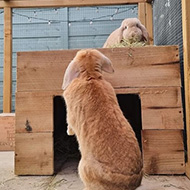Organisers reflect on success of RAW 2022

"We are so grateful to everyone who got behind this year's campaign" - Charlotte Varley.
The organisers of Rabbit Awareness Week (RAW) have announced that this year's campaign, which took place from 28 June to 4 July 2022, has been consider one of the most successful RAW campaigns.
This year's theme, 'Room for Rabbits', highlighted the need for suitable environments, and resources and information were made available online for veterinary practices and pet owners to use and learn from.
Organisers of the campaign surveyed veterinary professionals who supported RAW to find out their views on the effectiveness of the campaign, and results showed that 98 per cent believed that RAW had a positive impact on the care of pet rabbits in the UK.
Other findings showed that 87 per cent believed that rabbit welfare is improving in the UK, 70 per cent downloaded a RAW campaign pack, 64 per cent promoted RAW in practice, and 55 per cent ran a social media campaign over the week.
Alongside surveying veterinary professionals, the organisers surveyed rabbit owners, to discover whether RAW had been successful in highlighting the issues with rabbit housing.
Of those surveyed, 64 per cent had downloaded a RAW pack, and 52 per cent said that they had learnt something new about rabbit welfare.
Almost half of owners surveyed (47 per cent) said that they would adding new items to their rabbits' environment, and 54 per cent stated that they would make new items for their rabbits or upcycle household items.
Charlotte Varley, communications manager at Burgess Pet Care, who organised the campaign, commented on its success: “We are delighted that RAW continues to have a positive impact on the lives of the UK’s pet rabbits, with this year’s campaign successfully raising awareness about the importance of creating the right environment, whether that’s indoors or outdoors.
“We are so grateful to everyone who got behind this year’s campaign – every veterinary practice, rabbit owner, rescue centre and pet shop retailer – for their fantastic response and continued support in helping us to improve rabbits’ health and wellbeing.
“Work has already begun on planning for next year’s campaign, and we look forward to announcing more details soon.”



 The latest
The latest